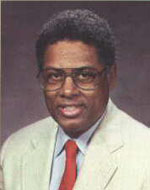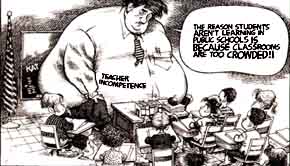|
|

Jewish World Review / July 9, 1998 / 15 Tamuz, 5758
Thomas Sowell
THERE HAS BEEN A FLURRY OF COMMENTS on the incredibly low level of knowledge revealed
by a recent test of applicants for jobs as teachers in Massachusetts. However, what is
even more important than what these applicants lack intellectually is how dangerous
such people are in our classrooms.
Why are dumb teachers dangerous? Because nature abhors a vacuum. If teachers'
minds are not filled with knowledge and understanding, they will be filled with other
things -- the kinds of things that appeal to shallow minds.
Take "trust-building" exercises, for example. All too typical of this kind of activity were a
group of blindfolded teenagers that I saw in Yosemite, holding on to one another and
being led through the woods by an adult, who was simply beaming at his own role in
this activity. There are many other varieties of trust-building activities indulged in on
school grounds or elsewhere.
The whole point of these exercises is to create the impression that you can rely on your
peers. Along with this is a considerable educational literature which creates the
impression that young people cannot rely on their parents, on traditional morality or on
the norms of a disdained "society."
There is probably no more dangerous period of life than adolescence. All the dedicated
efforts that have gone into raising a child to that point and all the deepest hopes that
these efforts will pay off in future years can be destroyed overnight in adolescence by
an unwanted pregnancy, drugs or any of the many other ill-advised adventures that
adolescents have gotten into.
Yet here are our taxpayer-supported schools teaching adolescents to rely on similarly
inexperienced teenagers around them for guidance and to emancipate themselves from
the knowledge and experience that their parents and other adults have acquired --
often painfully -- before them.
Shallow teachers, who are the least likely to grasp the huge dangers in promoting such
attitudes, are also the most likely to be attracted to such non-academic novelties.
The systematic undermining of morality that used to be called "values clarification" is
still going on in our public schools under other labels, now that parents and critics have
caught on to what "values clarification" really means. It means reducing moral principles
to mere subjective feelings, as if there were no social or intellectual processes through
which experience tests notions against realities.
The "non-judgmental" nature of much of the classroom social engineering that goes on
is consistent with this emphasis on feelings, on diaries and on other devices that put
personal feelings on the same plane as tested knowledge and tested moral principles
that enable a society to function.
It is hardly surprising that a steady diet of this kind of mush leads many children to think
that cheating is all right, as a recent survey showed, or leads some children to think it is
OK to start shooting people they don't like, whether at school or at home, as tragic
events at schools around the country have shown.
However surprising the Massachusetts test results may have been to some people,
what should be even more revealing is that this was the first time such a test had been
used to screen applicants for jobs as teachers in that state. In other words, these
incompetents would have sailed right through in previous years and spent a lifetime in
Massachusetts classrooms, spreading their ignorance and confusion to children.
In many other states, tests for teachers have existed longer than in Massachusetts but
often these tests are so easy to pass that they are meaningless. The political clout of
teachers' unions ensures that these tests will remain easy.
We hear a lot of talk about "artificial intelligence" being created by computers but a far
more important issue is artificial stupidity being created and spread to students by
teachers who abandon academics in favor of glittering social theories.
The neglect of hard knowledge and the failure to develop intellectual qualities in
students is just part of the high price of allowing shallow people to set the norms in our
public schools. Dumbness is dangerous. And tenured dumbness is doubly
 Dumb is dangerous
Dumb is dangerous
 That is why our schools are so full of fads, psychobabble and amateurish attempts at
social engineering. Much of this stuff is just silly but much of it is also dangerous to the
students and to the whole society.
That is why our schools are so full of fads, psychobabble and amateurish attempts at
social engineering. Much of this stuff is just silly but much of it is also dangerous to the
students and to the whole society.

7/02/98: Gun-safety starts with
parental responsibility
6/30/98: When more is less
6/29/98: Are educators above the law?
6/26/98: Random Thoughts
6/24/98: An angry letter
6/22/98: Sixties sentimentalism
6/19/98:Dumbing down anti-trust
6/15/98: A changing of the guard?
6/11/98: Presidential privileges
6/8/98: Fast computers and slow antitrust
6/3/98: Can stalling backfire?
5/29/98: The insulation of the Left
5/25/98: Missing the point in the media
5/22/98: The lessons of Indonesia
5/20/98: Smart but silent
5/18/98: Israel, Clinton and character
5/14/98: Monica Lewinsky's choices
5/11/98: Random thoughts
5/7/98: Media obstruction of justice
5/4/98: Dangerous "safety"
5/1/98:
Abolish Adolescence!
4/30/98: The naked truth
4/22/98: Playing fair and square
4/19/98: Bad teachers"
4/15/98: "Clinton in Africa
"
4/13/98: "Bundling and unbundling
"
4/9/98: "Rising or falling Starr
"
4/6/98: "Was Clinton ‘vindicated'?
"
3/26/98: "Diasters -- natural and political"
3/24/98: "A pattern of behavior"
3/22/98: Innocent explanations
3/19/98: Kathleen Willey and Anita Hill
3/17/98: Search and destroy
3/12/98: Media Circus versus Justice
3/6/98: Vindication
3/3/98: Cheap Shot Time
2/26/98: The Wrong Filter
2/24/98: Trial by Media
2/20/98: Dancing Around the Realities
2/19/98: A "Do Something" War?
2/12/98: Julian Simon, combatant in a 200-year war
2/6/98: A rush to rhetoric